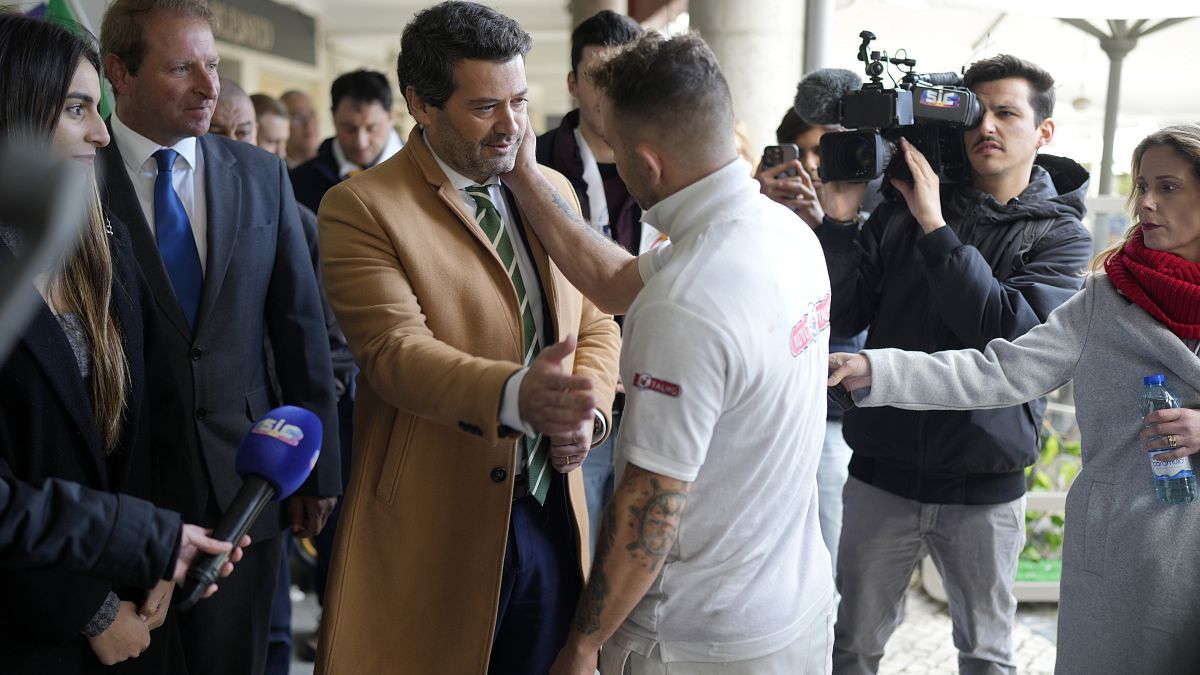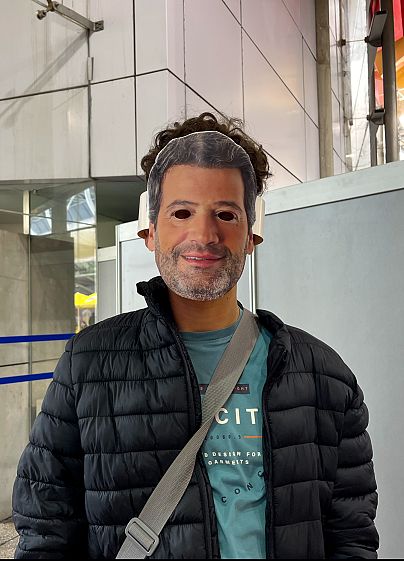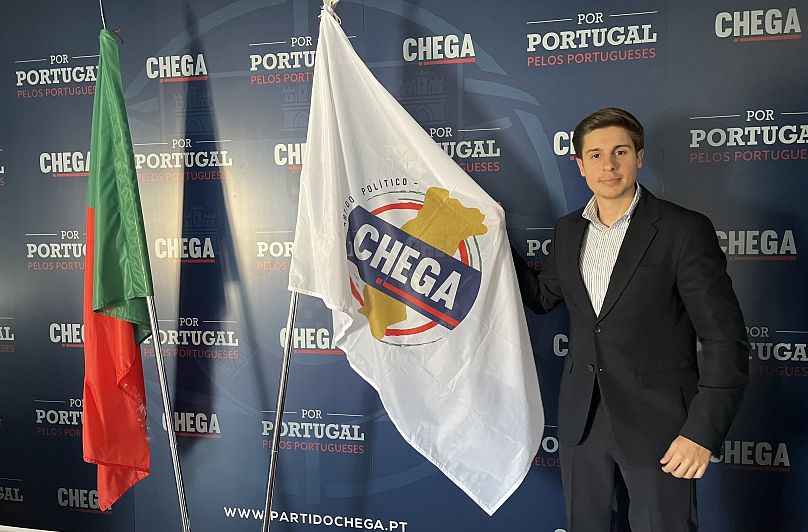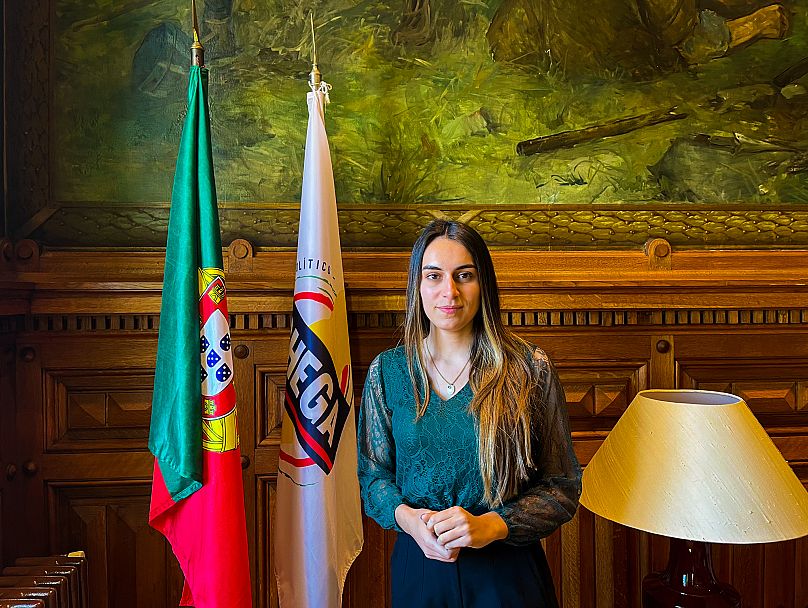Portugal’s far-right Chega party made historic gains in the country’s national elections held in early March. Taking 18% of the vote, the party sought to seduce Portugal’s youth, in a year which marks 50 years since Portugal overthrew its dictatorship.
André Ventura, the leader of Portugal's far-right party is popping red balloons with darts, under a sign which reads "Socialism explodes in Portugal". He is celebrating the gains made by his political party “Chega” (“enough" in Portuguese), at Futurallia, Portugal’s biggest student fair.
Chega came third in the snap elections held in early March, surging from 12 to 50 seats. The rise of the far-right comes as the country marks fifty years since the right-wing military dictatorship led by Antonio Salazar was overthrown.
A crowd of young people aged between 15 and 18 years old are cheering André Ventura on. This moment is being recorded and will later be shared on the party's social media accounts - namely TikTok - where the party and its politicians have amassed a large following. Ventura boasts over 280,000 followers on TikTok, while the Conservative Prime Minister Luis Montenegro doesn't have an account*.
18-year old Tiago watches on, his face hidden behind a mask of André Ventura, "it's funny that they even thought of handing out masks. I know Ventura isn't the perfect candidate, but he's trying to change things, and that's why I voted for him."
Besides him, 19-year old Joaqim who voted for the centre-right Democatic Alliance party which won March's elections. He may not be a Chega supporter, but he still wanted to catch a glimpse of the action, "I am originally from the Cape Verde, I think that André Ventura focuses too much on immigration but I think he wants to make changes for the youth.”
Young people in Portugal face two major problems, according to political scientist António Costa Pinto, "they are dealing with a very low average wage and an economy that cannot absorb educated young people. Emigration is in many cases the only alternative for this skilled labor." Young men "aged between 18-34 years old with lower levels of education voted for Chega in the highest numbers", adds Costa Pinto.
Banking on "negative perceptions of immigration"
Once his show of darts is over, André Ventura heads for the exit of the student fair. His every move is calculated as he stops to take selfies with fans. But there's one thing that he can't control: his opponents.
"You are fascists", shout a group of young people at the edge of the crowd. "Chega, Chega, Chega", reply his supporters.
16-year old Inez watches on, "I would never vote for him. Portugal had a dictatorship under Salazar, so it's frightening to see this today. I don't feel safe around these people." Her friend Raquel, worries about her future, "I see a lot of teenagers in this crowd, but one day they'll be able to vote."
A hate group according to NGOs
According to anti-discrimination organisations, Chega represents a threat to minorities, with the Global Project Against Hate and Extremism labelling the party a hate group.
"Chega is a form of propaganda because they wash away the racist ideas. People usually say they are voting against the system because they are tired of politicians. But it's a vote in support of racism and discrimination, which stands against minorities", 20-year old Lou, an activist for the NGO SOS Racismo tells Euronews.
In 2020, André Ventura told a politician to “go back to her country". He was targeting Joacine Katar Moreira, who is originally from Portuguese Guinea and had proposed a law for the restitution of art work to former colonies. Ventura has targeted the Portuguese Roma community, claiming its members are "addicted" to welfare. During the COVID-19 pandemic he also called for a separate isolation policy for the community.
Young Chega activists
25-year old Ricardo Reis waits outside the Chega party’s headquarters, located a few hundred metres away from the Portuguese Parliament. Wearing a sleek suit, Reis may work in the tech industry, but he spends his spare time campaigning for the party’s youth wing.
The young activist does not mince his words, using the term “parasite” to refer to immigrants who receive benefits from the Portuguese state, "we are experiencing a new wave of immigration, where you don't see families coming for a better life or trying to integrate themselves." Reis insists that the party is "not racist", all members are welcome but "what matters is that the person works and contributes to society."
This rhetoric mimics the words and slogans used by many far-right parties across Europe. In Portugal's case, a new wave of immigration has become the movement's focus, while others would say its scapegoat.
"In the last five years Portugal has experienced a new wave of immigration from South Asia, which marks a change from the historic immigration from former Portuguese colonies like Mozambique and Angola. This immigration may be essential to the economy, but a negative perception of immigration related to insecurity has allowed Chega to make gains", explains Professor Costa Pinto. The southern Portuguese region of the Algarve which has a tourism-based economy and "relies on a migrant workforce", voted for Chega in the highest numbers.
"Young people join us in secret"
25-year old Rita Maria Matias who defines herself as an 'anti-feminist' and stands against abortion was reelected to the Portuguese Parliament last month. Hailing from a political family, her father Manuel Matias, was the leader of Portugal's defunct anti-abortion party Pro Vida.
"We have lots of young people coming to us in secret, some have created tensions in their families in order to join the party. There are a lot of scars in Portugal but I'm not responsible for an authoritarian period during which I wasn't living," Matias tells Euronews. In 2021, the party adopted the slogan "God, country, family and work", strikingly similar to Portuguese dictator António de Oliveira Salazar’s “God, country, family” motto.
Matias worked as a campaigner in the party's youth wing and managed André Ventura's Tiktok account. "We have a formal communications team which manages Mr. Ventura's content but then we all are responsible for our own personal accounts, where we try and be as natural as possible", says Matias.
In 2022, she became the party's first female politician and its youngest - until 20-year old Madalena Cordeiro overtook was elected last month.
"We are tired of feeling that in France, in England, in Switzerland, young people have more opportunities than in Portugal", says the young politician who blames this situation on immigrants "we are being replaced and nobody cares".
For Matias, making ties with the rest of Europe's far-right remains a priority ahead of June's European elections. Jordan Bardella, head of France's far-right Rassemblement National for the upcoming European elections "is a friend", she says with a smile.
As for Chega's stance on Europe, the party remains cautious, "they do not play Eurosceptic card too much because they know that the European Union is quite popular in Portugal, due to its association with economic development," says Professor Costa Pinto.
* at time of publication



